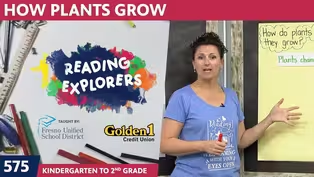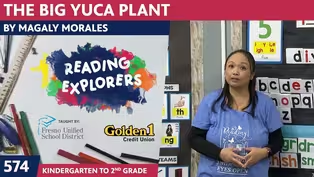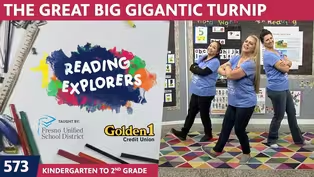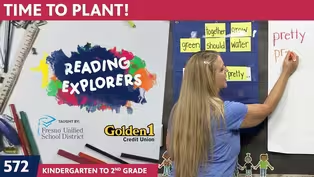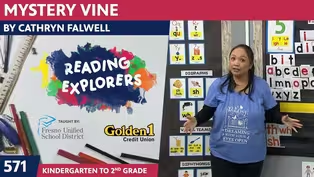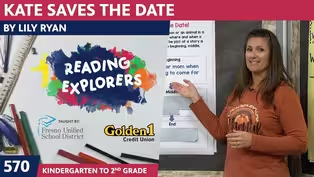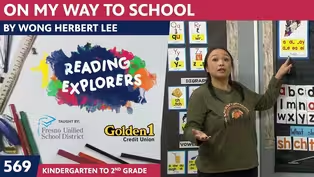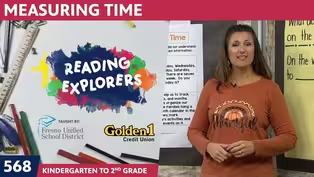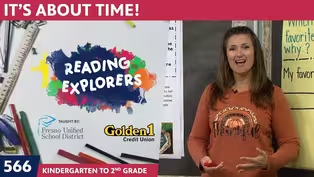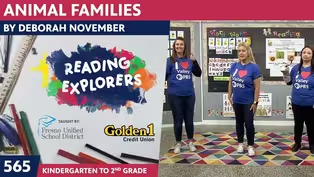
3-356: Open Syllables
Season 3 Episode 315 | 14m 8sVideo has Closed Captions
Join Mrs. Nix at Camp Discovery!
Third Grade teacher, Mrs. Nix, welcomes students back to Camp Discovery, a fun learning space packed with reading adventures & fun games!
Problems playing video? | Closed Captioning Feedback
Problems playing video? | Closed Captioning Feedback
Reading Explorers is a local public television program presented by Valley PBS

3-356: Open Syllables
Season 3 Episode 315 | 14m 8sVideo has Closed Captions
Third Grade teacher, Mrs. Nix, welcomes students back to Camp Discovery, a fun learning space packed with reading adventures & fun games!
Problems playing video? | Closed Captioning Feedback
How to Watch Reading Explorers
Reading Explorers is available to stream on pbs.org and the free PBS App, available on iPhone, Apple TV, Android TV, Android smartphones, Amazon Fire TV, Amazon Fire Tablet, Roku, Samsung Smart TV, and Vizio.
Providing Support for PBS.org
Learn Moreabout PBS online sponsorshipMore from This Collection
Valley PBS and Fresno Unified School District have partnered with Golden 1 Credit Union to create Reading Explorers Lessons for grades Pre-Kindergarten through Third grade. The daily lessons will be taught by Fresno Unified School District teachers and are created to help students practice their reading skills and reinforce lessons during distance learning.
Video has Closed Captions
Learn about the life cycle of a plant on Reading Explorers. (26m 39s)
K-2-574: The Big Yuca Plant by Magaly Morales
Video has Closed Captions
Join the Reading Explorers as we adventure into a new book The Big Yuca Plant. (26m 30s)
K-2-573: The Great Big Gigantic Turnip
Video has Closed Captions
What will happen at The Great Big Gigantic Turnip? (26m 30s)
K-2-571: Mystery Vine by Cathryn Falwell
Video has Closed Captions
The Bell has rung and the Valley PBS Classroom is open once more. (26m 32s)
K-2-570: Kate Saves The Date by Lily Ryan
Video has Closed Captions
Mrs. Nix, Mrs. Hammack and Mrs. Vang are glad to have you join her for a new day. (26m 32s)
K-2-569: On My Way To School by Wong Herbert Lee
Video has Closed Captions
Mrs. Vang is ready for a new day of phonemic awareness and reading comprehension. (26m 40s)
Video has Closed Captions
We review phonics, frequency words and more on Reading Explorers. (26m 45s)
K-2-567: Nate The Snake Is Late
Video has Closed Captions
What happens when Nate the Snake is late to school? (26m 49s)
Video has Closed Captions
It's time for school! How do you know what time it is? (26m 31s)
K-2-565: Animal Families by Deborah November
Video has Closed Captions
Welcome to the Reading Explorers lessons in the Valley PBS Classroom. (26m 14s)
K-2-564: From Caterpillar To Butterfly
Video has Closed Captions
The transformation from Caterpillar to Butterfly is a special one. (26m 52s)
Providing Support for PBS.org
Learn Moreabout PBS online sponsorship- ♪ Good morning to a brand new day ♪ ♪ Time to learn and games to play ♪ ♪ Learning things is so much fun ♪ ♪ Learning is good for everyone ♪ (upbeat music) - Good morning, third graders.
My name is Mrs. Nixon.
I am so excited to be here to support you as you become amazing thinkers, readers, and writers.
This morning, I was checking out one of my favorite books.
This one's called "The Stinky Truth," or I should say, "Little Lies, The Stinky Truth.
And if you love comic books, if you're into this genre, I'm telling you this one looks really hilarious.
It even has a little sticker on here that says scratch and sniff here with a little asterisk that says this might be a lie.
So now I don't know if I should scratch and sniff it because do you think they're trying to trick me?
Oh, if you wanna find out some really funny things about telling the truth and maybe some little bit of a lie in there and laughing, then you would wanna check a book like this out.
Now there's several ways you can do that.
You can check it out through your local County library or in Fresno unified, you can check out the book on the app called Sora.
Now I have a couple of things that I wanna talk about before we start today.
I also wanna say that we have these really fun activity books.
Now, if you see that address that pops up on the screen right below me, all you need to do is send me a letter and I will put one of these in the mail for you.
Don't forget to include your address so I know where to send it.
You could let me know maybe a book that you're reading and I'll make sure that I share it here on the air.
All right.
So third grade, I've got three things that we're gonna go through today.
We're gonna talk about some prefixes and suffixes.
We're gonna look at open syllables and then we're gonna finish off little comprehension with some homophones.
I know we've talked about those in the past.
Are you ready to start?
Okay.
Let's begin by looking at those high frequency words those words we see often in reading and writing and you guys know that drill.
If you see one up here that you think to yourself, "Hmm, I don't know if I remember how to spell that," jot it down, put it on a post-it note while you're brushing your teeth, practice it, by the end of the week you'll have it.
Okay.
Let's go through and let's read them together.
Here we go.
Full, from, gave, funny, get, give, go, goes, good, and going.
All right.
So today we're gonna look at full, F-U-L-L and from F-R-O-M. Help me put them in a couple of sentences today.
Who did you receive a letter, hmm ?
And my stomach feels very hmm after lunch.
I don't know about you but my stomach definitely feels very full after lunch.
So just from go at the end, let's look.
Who did you receive a letter from?
Oh, that makes sense.
Who was it from?
Excellent.
All right.
So let's go through, we're going to switch gears.
I wanna talk about prefixes and suffixes.
Now we've been practicing the last few weeks all about prefixes, all about suffixes.
And this week we're gonna put them together and we're gonna play with them and kind of make up some words today because I have all of... not all, but I have several up here to choose from.
Okay, so you're gonna see this week, we're gonna review a couple of prefixes re and un.
Remember re means again, and un means not.
And then if I jump all the way over here I'm gonna talk about the suffixes.
Now we've got ly which means in a certain way, full means full of an able means capable or able to.
Okay.
So remember our base words we kinda talk about this every single week too when we're talking about prefixes and suffixes.
Our base words are just that, they're a base word.
They stand all by themselves and have their own meaning.
But we can add a prefix, a suffix or both and change the meaning of the word.
So let's look right here.
We have the word important.
If I take the prefix un, and put it in front of important, what happens to my word?
What does this word unimportant mean?
That's right on means not, so it really means it's not important.
And I would say it's unimportant.
All right, great.
How about this one?
If I have the word fair, usually we think about things that are fair, they're equal or the same, but what if I put un in front of it?
Now, Is it still fair?
No, now it's not fair.
It's not fair.
Now, what if I wanna just make this a little bit changes up just a little bit more?
What if I was gonna tell you how it was done, how somebody played a game and maybe they played very unfairly.
They played unfairly.
It tells us how they did it.
And let's do one last one just to kind of practice a little bit more.
So fill, if I'm thinking about filling up a cup if I'm able to fill that up, I could say it's a fillable cup, right?
My cup is fillable.
Now there's a couple of different things I could say it's an unfillable cup, which means it's not.
Or I can put re in front of it and look at this refillable.
So that means that it can be filled again and again, right?
So playing with our prefixes and suffixes and building our words and changing them helps us with our vocabulary, helps us when we're reading.
And so this is something that you could do at home by cutting up little parts of your words and putting them together.
Okay.
I'm gonna switch gears just a little bit.
And we're gonna talk about some syllable types.
Now I have this poster, we've talked about it all year long.
We talked about closed syllables a couple of weeks ago.
Now we're gonna talk about open syllables.
And so just to remind ourselves what an open syllable is, it's going to make that long vowel sound.
And I'm gonna show you a couple of examples on how to do that.
So let's go through and let's look at that.
Okay, I need a pin.
All right.
So let's look right here.
Here's the word human.
Now, if I didn't know that, remember what we always do with our, when we're looking for syllables, we're always looking for the vowels.
What's a vowel, A E I O U.
Good, okay.
So find our vowels, mark them.
Now this time there's only one consonant in between.
And so the place that we want to divide because each syllable has one vowel sound.
So we know that there are two syllables.
We're just deciding where do we split it.
We always split it right after that first vowel, right before that consonant, there we go.
Can't figure the word.
So we're gonna have a long vowel sound.
So hu/man.
All right.
We've got two syllables.
Let's do it again.
Find those vowels, A E I O U, we've got e and a.
So we're gonna say these are vowels.
I'm gonna mark them with vowels.
I've got one consonant.
I'm gonna split it right before that consonant.
So I've got le/gal, le/gal, got that long vowel sound.
Excellent.
I'm gonna show us cause we've got some opportunities here that we can kind of practice it.
So this is what it's gonna look like when we go through.
And if we had it on kind of like a worksheet if your teacher's asking you to do it.
So what this particular part is here at the top it's asking you to do you're gonna read each word in bold and it says circle the answer that shows the word correctly divided into syllables.
Okay.
So let's look at this first one.
It says open.
Now, do you remember what we said?
We're looking for the vowels.
I'm gonna mark it right here just so I can see it.
So I can say, okay, those are my two vowels and I wanna mark right before my consonant right there.
Okay, do we see it?
Yes, we do o/pen right there.
Let's do one more.
So I'm looking for my vowels.
A E I O U, here's my vowel, here's my vowel, here's my consonant.
I'm gonna mark right in front of it.
So which one is divided correctly?
Pol, no, that's not it.
Po, yes.
Po/lar, good.
Right there.
Awesome job.
All right, let's do one more.
Looking for my vowels.
A and O, here's my consonant.
I would divide it right after my vowel, right before my consonant.
I'm gonna mark them so we can see them.
So which one is showing us the correct way to do that?
Right here.
Good, fa/vor.
Let's switch gears just a little bit and talk about those prefixes and suffixes.
Now here, it's telling us, add the prefix or the suffix to the root word and write that new word.
So let's go through and let's do it.
So we have un and zip.
What's our new word?
You got it, unzip.
And we're just gonna put it all together.
Great.
How about re and write, what would that be?
You got it, rewrite.
That means we're gonna write it again.
How about sad and ly?
Yes.
We just put it all together, sadly.
Last one, care and ful.
We have the word careful.
So we're full of care, right?
Nice job, third grade.
Let's wrap up today.
We're gonna talk about homophones.
Do you remember, we've talked about homophones before.
Do you remember what they are?
You put in your hand like this?
Yeah, because it has to do with sounds.
Homophones are talking about words that sound the same.
They're not spelled the same, they don't look the same, but they sound the same.
So here's an example today.
All right, here's my sentence.
The introduction of the T Model helped to end the reign of the electric car.
So I've got this word right here reign underlined.
That looks funny, right?
What reign are you thinking of?
Are you thinking of R-A-I-N, rain?
So what does this rein, R-E-I-G-N. That's a homophone.
So let's look here.
I've got two different definitions that we can look at.
We can look at water that falls and drops from clouds.
Which rain is that?
You got it.
R-A-I-N.
So what does R-E-I-G-N mean?
Let's read it.
A period in which a person or thing is dominant.
So what was dominant in this time, period?
You got it.
So before the model T's, there were electric cars.
Did you know that?
Oh my goodness.
Amazing.
So third grade we have done a lot today.
We've practiced our prefixes, our suffixes.
We've looked at some open syllables, and then we finished up practicing a little bit with homophones.
You got it.
So today is your reading.
Try looking for all of these, play with some of your words because that's going to help you with your vocabulary.
So thanks for hanging out with me today.
As you're getting ready for school, remember you are responsible for your learning success.
So listen, ask questions, and share your ideas because together we can do so much more.
I can't wait to see you back here at PBS tomorrow.
Have a wonderful afternoon.
And I will see you then take care.
Bye-bye.
♪ Good morning to a brand new day ♪ ♪ Time to learn and games to play ♪ ♪ Learning things is so much fun ♪ ♪ Learning is good for everyone ♪
Support for PBS provided by:
Reading Explorers is a local public television program presented by Valley PBS
